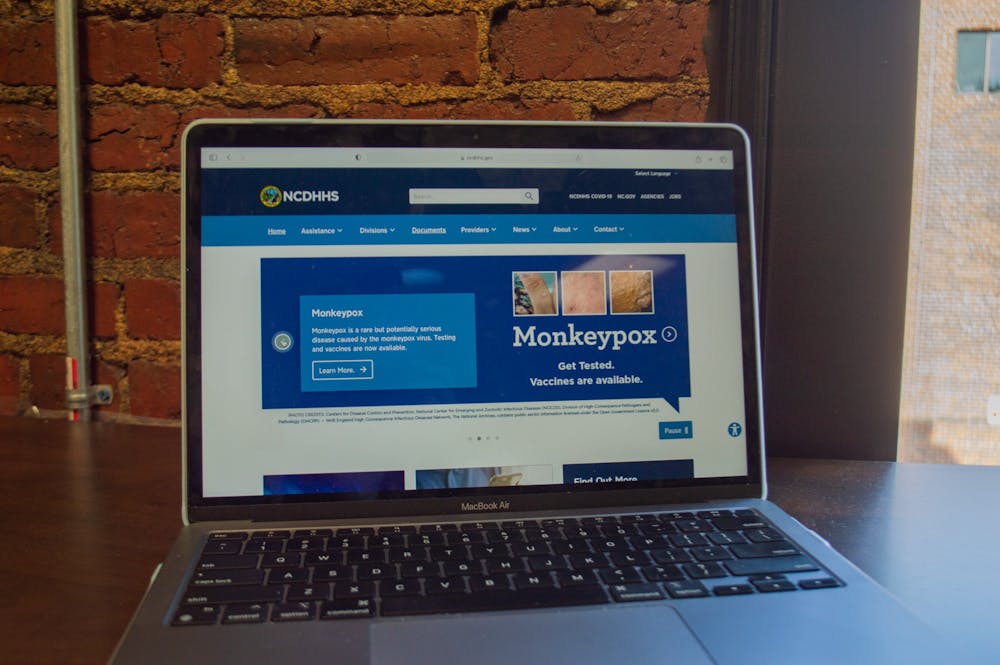JYNNEOS is a monkeypox vaccine and is the CDC's preferred protection against the rare disease. The vaccine requires two doses, and it takes 14 days after getting the second dose of JYNNEOS to reach maximum immune protection.
According to the NCDHHS, vaccine supply is limited. Therefore, the department is prioritizing people with monkeypox exposure or who have a higher risk of exposure. Kansagra said that they have over 10,000 doses of vaccine in North Carolina for those who might be most affected.
Vaccine eligibility criteria include the following in North Carolina: anyone who had close contact in the past two weeks with someone who has been diagnosed with monkeypox — and gay or bisexual men, or transgender individuals who had multiple sex partners or anonymous sex, were diagnosed with a sexually transmitted infection or received medications to prevent HIV infection.
Orange County's response
The Orange County Health Department has been in direct communication with the first infected individual in the county, according to an Aug. 17 press release.
“We have been preparing for a case of monkeypox and now that it is here, we want our community to be aware of this disease so that those at risk can seek medical care and get tested promptly if they have symptoms,” Orange County Health Director Quintana Stewart said in the release.
While the vaccine location at 414 E. Main St. in Durham serves as the monkeypox vaccine hub for Orange County, there have been a few pop-up clinics in the county, Carrboro Mayor Damon Seils said.
"We are working with our community health colleagues at the health department to hopefully set up some community events in the not-so-distant future," Margaret Campbell, a family nurse practitioner at the Orange County Health Department, said.
Seils, who received his vaccine at the Durham County Department of Public Health, said he encourages those who are in high-risk populations to get the monkeypox vaccine.
Vaccine disparities
Although anyone can get monkeypox, almost all of North Carolina’s monkeypox cases are currently in men who have sex with men, according to the NCDHHS.
Black men make up most of the state's monkeypox cases.
To get the day's news and headlines in your inbox each morning, sign up for our email newsletters.
"While 70 percent of cases are in Black men, Black North Carolinians are receiving less than a quarter of the vaccinations," an Aug. 10 NCDHHS report said.
In contrast, white men account for only 19 percent of cases, yet white North Carolinians have received 67 percent of the vaccine doses.
"The thing that we really want to do is make sure we are providing clear and destigmatizing information," Kansagra said. "We know there already is a lot of stigma out there with the community and we really want to make sure what we're doing is not creating more stigma."
As a gay man, Seils is concerned about possible increased stigma and misinformation that may come with an increase in monkeypox cases. He said people need to be aware that anyone can become infected with monkeypox — and it is not a sexually transmitted disease.
Seils added that he is also concerned about the vaccine disparities that affect Black men. The people who are most at risk often have less access to the resources they need, he said.
"Different populations of people, especially when it comes race and ethnicity, have differential access when it comes to health care," Seils said.
General information
According to the NCDHHS and CDC, early symptoms of monkeypox can include fever, exhaustion, headaches and, rarely, a sore throat and cough. A rash that might look like pimples or blisters appears shortly after.
Symptoms usually start within three weeks of exposure to the virus and it typically lasts from two to four weeks. Monkeypox can be spread from the time symptoms start until the rash has healed.
The CDC said that monkeypox can spread to anyone through close, personal, skin-to-skin contact.
This can include direct contact with an infected person's rash, scabs or bodily fluids, touching objects, fabrics and surfaces that have been used by someone with monkeypox, or contact with respiratory secretions from an infected individual.
Direct contact might happen during intimacy, including the following: oral, anal or vaginal sex, touching the genital area of a person with monkeypox, hugging, massaging or kissing and prolonged face-to-face contact.
Kansagra said that if North Carolinians are concerned that they may be infected, they should reach out to their primary care provider.
"Every provider can do that: They can swab and check and send it off to a laboratory," she said. "We really encourage people to be aware and to get tested if they have concerns."
@emmymrtin
@DTHCityState | city@dailytarheel.com
Emmy MartinEmmy Martin is the 2023-24 editor-in-chief of The Daily Tar Heel. She has previously served as the DTH's city & state editor and summer managing editor. Emmy is a junior pursuing a double major in journalism and media and information science.




